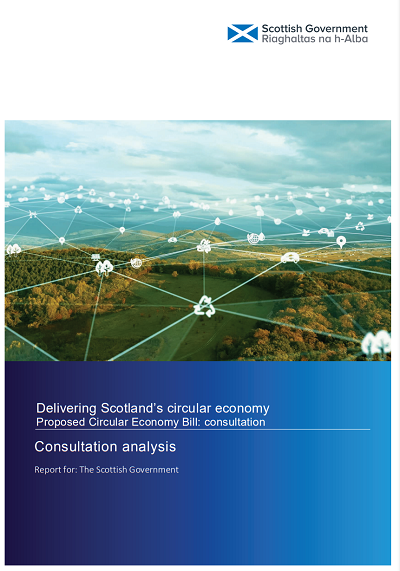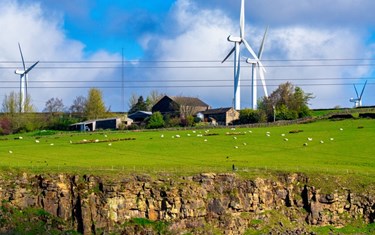You can view the bill here and the consultation request here.
Circular economy strategy
1) Is a statutory requirement needed for a circular economy strategy?
Yes
2) Is there anything else you would like to say about a circular economy strategy? (Section 1 – 5)
The planning system has a significant role to play in supporting the transition to a circular economy. Planning can embed circular economy principles through mandating or encouraging the adaptive reuse of existing buildings, ensuring new developments are future-proofed through adapting or recycling structures, and the recycling of demolition waste. However, planning is not just a key function for delivering these vital components of a circular economy. It should also be recognised as an integral and overarching means by which we can reduce resource consumption in society. The purpose of planning is to manage the use and development of land in the long-term public interest. Land itself should be considered as a material or commodity that, through a functioning planning system, can be either protected, developed, redeveloped, or managed in a manner that contributes to a functioning circular economy. This can be seen with policies that encourage the re-use of vacant and derelict land and which disincentivise greenfield development.
Further to this, the development permitted on this precious resource will also impact upon consumption rates; for example, with more densely populated areas consuming fewer materials on average (see https://data.europa.eu/doi/10.2800/389017). Therefore, by creating dense and walkable places with high quality placemaking through the implementation of 20-minute neighbourhoods, planning can reduce societal resource consumption whilst also addressing a plethora of other outcomes such as reducing health inequalities and meeting net-zero carbon targets (see https://www.rtpi.org.uk/research/2021/march/20-minute-neighbourhoods). The vital role planning can play in moving towards a circular economy has been recognised within the recently published NPF4, with an updated and expanded policy on zero waste, and set out within the guidance on Local Development Plans (LDPs). With the NPF4 and next generation LDPs now set for 10 years, RTPI Scotland is unsure of the intended synchronicity between the Circular Economy Strategy, if set at 5 years.
Another approach may be to set the strategy for a 10-year period whilst allowing for periodic reviews. It is worth noting that regarding waste planning, strategic planning approaches can be more successful. Therefore, the emerging role of Regional Spatial Strategies (RSSs) should be considered fully through any proposed Circular Economy Strategies and within the impending guidance due to be issued on RSSs.
3) How should circular economy strategies be aligned with climate change plans and other environmental targets (including biodiversity goals)?
RTPI Scotland believes there should be full alignment between circular economy strategies and climate change plans/environmental targets (including biodiversity goals). The implementation of a circular economy is crucial to the delivery of our climate change targets and biodiversity goals. If we are to achieve these, any circular economy strategy that is prepared must clearly demonstrate its contribution to delivering our climate change plans and environmental (and biodiversity) targets. These targets must also be embedded within, and form the foundation of, the circular economy strategies prepared. As these plans and targets are reviewed, a clear review and monitoring process must be adopted to ensure that circular economy strategies continue to accurately reflect and actively contribute to the delivery of our climate change and environmental plans/goals/targets. In our response to the “Delivering Scotland’s Circular Economy” consultation in August 2022, we noted our support of the establishment of a circular economy public body. We believe such a body could support Scotland’s ambitions to deliver the aspirations of a circular economy and ensure the alignment of circular economy strategies with other relevant and associated plans and policies, including climate change plans and environmental targets.
Such a public body could also provide an opportunity to build upon Zero Waste Scotland’s role as Scotland’s circular economy expert, which works to
build relationships with local stakeholders and link with other relevant activity taking place on a regional and local level. Such activity could include development and delivery of City Region Deals and regional economic development priorities, but also, as set out in response to Q1, the preparation of LDPs and RSSs. RTPI Scotland is interested in if and how such a body would evaluate the performance of the planning system regarding the circular economy. This would include, for example, how such a public body would engage with the new National Planning Improvement Champion in evaluating the performance of planning authorities.
Circular economy targets
1) Are statutory circular economy targets needed?
Yes
2) Is there anything else you would like to say about powers to introduce circular economy targets? (Sections 6 and 7)
RTPI Scotland welcomes the recognition that there should be greater ambition in the field of consumption and reduction targets. We note that, as set out in the consultation document, research findings conclude that statutory targets are a feature of high-performing systems in other nations or regions, particularly where they are introduced alongside other key measures. As set out in our response to Q1 and Q2, there are a number of key measures RTPI Scotland believes need taken to support the planning system in helping deliver any proposed statutory targets. RTPI Scotland supports the monitoring and reporting process outlined in Section 7 of the Bill. Although the specific details of this are still to be determined through the preparation of associated regulations, if this Bill is to have a positive and lasting effect it is imperative that circular economy targets undergo a robust and transparent review, monitoring and reporting process. Only through effective reporting and monitoring will it be possible to ensure the ongoing relevance of circular economy targets, as well as the effectiveness of associated delivery actions.
Restrictions on the disposal of unsold consumer goods
1) Do you think there is a need for additional regulation restricting the disposal of unsold consumer goods?
No comment
2) Is there anything else you would like to say about the disposal of unsold consumer goods? (Section 8)
No comment
Charges for single-use items
1) Should Scottish Ministers have powers to make regulations that require suppliers of goods to apply charges to single-use items?
No comment
2) Is there anything else you would like to say about charges for the supply of single-use items? (Section 9)
No comment
3) How do you think Scottish Ministers should use their powers to have the greatest impact in transitioning to a circular economy?
No comment
Household waste
1) Should it be a criminal offence for a householder to breach their duty of care in relation to waste under the Environmental Protection Act 1990 (e.g. to fail to ensure that waste is disposed of to an authorised person)?
No comment
2) Is there anything else you would like to say about household waste and enforcement of household waste requirements? (Sections 10 & 11)
No comment
3) Is further action needed, either within or outwith the Bill, to tackle flytipping effectively? If so, what action is needed?
No comment
Household waste recycling – Code of Practice and local targets
1) Should the Code of Practice on household waste recycling (currently a voluntary code) be put on a statutory footing?
No comment
2) Is there anything else you would like to say about a Code of practice on household waste recycling? (Section 12)
No comment
3) Should Scottish Ministers have powers to set targets for local authorities relating to household waste recycling?
No comment
4) Is there anything else you would like to say about targets for local authorities relating to household waste recycling? (Section 13)
No comment
5) Is further action needed, either within or outwith the Bill, to support local authorities to achieve higher household recycling rates? If so, what action is needed?
No comment
Lifting from vehicles
1) Should civil penalties for littering from vehicles be introduced?
No comment
2) Is there anything else you would like to say about civil penalties for littering from vehicles? (Section 14)
No comment
Enforcement powers in respect of certain environmental offences
1) Should enforcement authorities in Scotland be given powers to seize vehicles linked to waste crime?
No comment
2) Is there anything else you would like to say about enforcement powers? (Sections 15 and 16)
No comment
Reporting on waste and surpluses
1) Should Scottish Ministers have powers to require persons to publish information on anything they store or dispose of (except in relation to domestic activities)?
No comment
2) Is there anything else you would like to say on reporting? (Section 17)
No comment
3) How should Scottish Ministers go about identifying which types of waste and surpluses should be subject to mandatory public reporting identifying waste and surplus for mandatory reporting:
No comment
Net zero
1) Do you think the Bill will play a significant role in achieving these net zero targets? Please give your reasons.
The Bill has the potential to play a significant role in achieving our net zero targets. However, in order for this to happen, it is imperative that the Bill is implemented having regard to other relevant plans and policies. As per our response to Q2, RTPI Scotland believes there should be full alignment between circular economy strategies and climate change plans/environmental targets (including biodiversity goals). The implementation of a circular economy is crucial to the delivery of our climate change targets and biodiversity goals. If we are to achieve these, any circular economy strategy that is prepared must clearly demonstrate its contribution to delivering our climate change plans and environmental (and biodiversity) targets.
It is also imperative that measures taken to implement the Bill acknowledge the vital role of the planning system in delivering circular economy principles. This is recognised in the recently published NPF4, which includes an updated and expanded policy on zero waste, and is also set out in the guidance on Local Development Planning. Planning can embed circular economy principles through mandating or encouraging the adaptive reuse of existing buildings, ensuring new developments are future-proofed through adapting or recycling structures, and the recycling of demolition waste. However, it is also an integral and overarching means by which we can reduce resource consumption in society. The purpose of planning is to manage the use and development of land in the long-term public interest. Land itself should be considered as a material or commodity that, through a functioning planning system, can be either protected, developed, redeveloped, or managed in a manner that contributes to a functioning circular economy. This can be seen with policies that encourage the re-use of vacant and derelict land and disincentivises greenfield development.
If the Bill is to play a significant role in achieving these net zero targets, it must be implemented in a way that closely aligns and works with these existing plans and policies. It will also be important that circular economy targets undergo a robust and transparent review, monitoring and reporting process. Only through effective reporting and monitoring will it be possible to ensure the ongoing relevance of circular economy targets, as well as the effectiveness of associated delivery actions.
2) There is a Policy Memorandum accompanying the Bill. This aims to set out the underlying reasons why the Scottish Government thinks the Bill is necessary. Did you find the discussion under “Sustainable Development” in the Policy Memorandum helpful or unhelpful in terms of understanding what impact the Bill would have in terms of reaching these net zero targets?
It is somewhat helpful.
We are pleased to see that the “Sustainable Development” section of the Policy Memorandum makes links back to the UN SDGs and the National Performance Framework. However, we note that this section is light on detail in relation to the intended impact the Bill would have on reaching Scotland’s net zero targets. In fact, the targets themselves do not appear to be given much mention at all within the Policy Memorandum.
The “Sustainable Development” principally focuses on the outcome of the BRIA and SEA pre-screening report. Key conclusions are that it is premature at this stage to fully assess the impact of the Bill’s implementation in terms of both its financial and environmental impacts. There is acknowledgement that the implications for businesses and individuals are likely to be better assessed during the consultation phases associated with the drafting of secondary legislation to bring the Bill into force.
Although the Policy Memorandum acknowledges the importance of collaborative efforts by a variety of stakeholders in delivering circular economy principles, it is disappointing to see no mention of the Place Principle within this document. The Scottish Government and COSLA have agreed to adopt the Place Principle to help overcome organisational and sectoral boundaries, and it could support the necessary collaborative place-based action required to deliver circular economy principles. This includes improving coordination between stakeholders, enhancing collaboration and communication across local authorities’ departments, key agencies, NGOs, and private sector. We believe this section of the Policy Memorandum (and indeed, the memorandum as a whole) could be strengthened with specific reference to, and consideration of, the Place Principle and place-based approaches to delivering the circular economy. Supporting this, the principle of using place-based approaches to promote the development of the circular economy at the local level has been set out in Zero Waste Scotland’s Circular Cities and Regions programme (see https://www.zerowastescotland.org.uk/resources/circular-economy-cities-and-regions). As a key emerging policy area set out in the NPF4, this section could be strengthened with reference to the opportunity to align circular economy ambitions with the principles and objectives of Community Wealth Building (see https://www.gov.scot/policies/cities-regions/community-wealth-building/).
General comments or aspects not in the Bill
1) Are there any areas not addressed by the Bill that you believe should be included? If so, what are they?
No comment
2) Are there international examples of best practice in legislation supporting the transition to a circular economy?
No comment
Resource and Waste Common Framework
1) Do you have comments on how this wider framework should function to support Scotland's transition to a circular economy, in particular on the provisional Resources and Waste Common Framework?
No comment



